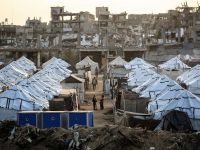OPEC oil ministers, making reassuring noises about stable prices, indicated they would maintain current production levels at a meeting Tuesday overcast by Iraq's abrupt halt to UN-supervised oil exports, said AFP.
Iraq, though not a member of OPEC's production quota system because of UN sanctions following its 1990 invasion of Kuwait, took center stage Saturday in what most ministers had thought only a week ago would be a routine meeting to hold output steady.
The oil-producing cartel spent Monday soothing concerns that the Iraqi suspension risks sending fuel prices skyrocketing, saying it can plug any shortfall if necessary, according to the agency.
But it also insisted it did not have to act immediately, virtually ruling out an increase in production Tuesday.
"I do not believe we will increase production at the meeting tomorrow (Tuesday)," said Chakib Khelil, Algeria's oil minister who chairs the 11-nation Organization of Petroleum Exporting Countries (OPEC).
Ministers were to gather Tuesday morning for a meeting of the Market Monetary Committee, then adjourn into informal meetings at a luxury hotel where the output decision is normally taken. The quotas are then rubber-stamped at the cartel's headquarters in the Austrian capital, and announced.
Arriving in Vienna ahead of the formal meeting, ministers downplayed fears that the Iraqi decision could lead to the kind of soaring prices which led to fuel protests in Europe last year.
"We will not let the market be taken hostage" by the Iraqi decision, said one delegate at the meeting, quoted by AFP.
Iraq's senior representative for the meeting, junior minister Taha Moussa, upon his arrival in Vienna, appeared to signal a possible opening for diplomacy, saying Baghdad would maintain the export suspension for one month before re-evaluating it.
"We will be ready to resume exporting oil if they (the Security Council) would accept the memorandum of understanding for six months," Moussa said, referring to a renewal of the UN oil-for-food regime slapped on Baghdad in 1996.
Iraq confirmed Monday it had suspended its exports of 2.2 million barrels per day (bpd) of crude, some 8 percent of the cartel's total output.
Prices spiked in London, with benchmark Brent jumping by some 50 cents but falling back to near its start at $29.09 by late afternoon, following the calming words from Vienna.
According to AFP, the OPEC meeting has been widely expected to hold production levels, since prices have stabilized around the cartel's target price of $25 a barrel.
World oil prices have broadly stabilized this year after a two-year rollercoaster which saw them dip below $10 in 1999, before soaring to 10-year highs last summer, sparking fuel protests in Europe.
But Baghdad cast a cloud over it by announcing a halt in its oil exports from Monday morning in a row with the UN over the terms of its oil-for-food program implemented after the 1991 Gulf War.
Baghdad is angry at an Anglo-US proposal for so-called "smart sanctions" which would tighten the embargo and clamp down on oil smuggling.
Saudi oil minister Ali Al Nuaimi remained tight-lipped Monday, said the agency.
Analysts said there were signs that the Saudis, by far OPEC's largest producers, were already increasing production.
"They have been telling their clients that they are tending to increase export availability in June," said Leo Drollas of the London-based Center for Global Energy Studies.
UN EXPERTS WATCH CLOCK ON IRAQI SANCTIONS REVAMP
Racing against the clock, UN Security Council diplomats launched negotiations on Monday on overhauling sanctions against Iraq, despite Baghdad's stoppage of oil sales, said Reuters.
Bangladesh's ambassador Anwarul Chowdhury, this month's council president, told a news conference the 15-member body was aiming to complete a resolution by the third week of June.
He said a meeting of experts would take place three times a week, beginning on Monday, and sessions with all 15 ambassadors would occur at least once a week.
"As president of the council it will be my intention to push it hard," he said. The council's self-imposed deadline is July 3, the end of a one-month extension to the current UN oil-for-food humanitarian plan for Iraq, a stopgap to allow members to negotiate a new plan.
Monday's talks among experts from the 15 council members ended with what diplomats said were discussions on how to proceed.
They expect to resume on Tuesday.
At issue is a draft resolution submitted by Britain and the United States several weeks ago that would lift restrictions on civilian goods imported by Iraq but tighten controls on military-related supplies and smuggling.
Baghdad wants the sanctions lifted and objects to any system, even if it eases imports on some goods, that would perpetuate them.
"It will not affect negotiations," US representative James Cunningham said in response to Iraq's action, according to Reuters.
But despite Chowdhury's optimism, the July 3 deadline may not be met, Reuters noted.
Council members from June 15 to 18 are in Kosovo and Belgrade, and the United Nations is hosting a major AIDS conference the last week of June. However, both US and British officials say the council is committed to meeting the deadline and does not want to lose the momentum – Albwaba.com
© 2001 Al Bawaba (www.albawaba.com)







